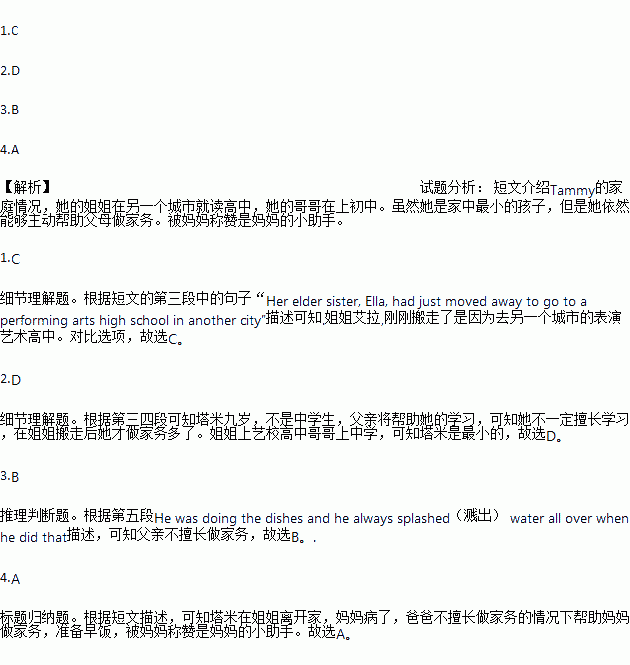题目内容
"Tammy! Come here, please! Mother needs your help in the kitchen." Her father called out to her.
Tammy was in her room, getting ready to do her homework. "Yes, Daddy!" she replied. "I'll be right there."
She hurried out of her bedroom and down the hallway. She was only nine years old. Her elder sister, Ella, had just moved away to go to a performing arts high school in another city. Her brother, Harry, was in middle school and always got home late. With Ella leaving home, Tammy was expected to do a lot more than she had ever done before, especially now, because her mother was ill.
Her father was in the kitchen. "Tammy, I know you usually do your homework right now, but with things being different, we all have to change a little bit. I'll help you and Harry with your homework later on, OK?"
Her father had an apron(围裙) on over his clothes, and he looked kind of funny. He was doing the dishes and he always splashed(溅出) water all over when he did that. After helping her father with the dishes, Tammy helped set the table.
After supper, her father helped her and Harry with their homework, and then they played a board game so that their mother could lie down for a while.
The next morning, Tammy got up early on her own because she wanted to help her mother with breakfast. She made orange juice and even put bread in the toaster and got out the butter so that her mother could sleep for a few more minutes.
When her mother got up half an hour later, she was very surprised and moved to see the breakfast on the dining table. She gave Tammy a big hug.
"Thank you, Tammy. You really are mother's little helper now, aren't you?"
1.Why did Tammy's sister move out of their home?
A. Because she hated doing housework
B. Because she was busy with her work.
C. Because her school was far away from home
D. Because she disliked her family.
2.From Paragraphs 3 & 4, we can learn that Tammy_______.
A. was a middle school student
B. did well in all subjects
C. always did a lot of housework at home
D. was the youngest child in the family
3.What can we learn about Tammy's father from the passage?
A. He was a very serious person.
B. He wasn't very good at doing housework.
C. He liked playing board games very much.
D. He always helped Tammy do her homework.
4.Which is the best title for this passage?
A. Mother's Little Helper B. The Life of Tammy's Family
C. A Happy Family D. Tammy's School Life
 天天向上一本好卷系列答案
天天向上一本好卷系列答案 小学生10分钟应用题系列答案
小学生10分钟应用题系列答案阅读下面短文,并根据所读内容,在文章后第1~10小题的空格里填入一个最恰当的单词。注意:每个空格只填1个单词。
Let’s face it: homework can be almost as frustrating (沮丧) for parents as it is for kids. Getting kids to do their homework can be a challenge, and when they do sit down to study, a lot of other problems can appear.
Doing homework may not be as fun as playing video games or chatting with friends, but it shouldn’t be something that kids hate. Your children’s assignments (任务) should help them build a skill or learn something new.
You can help by being a homework monitor, stepping in to answer questions or offer encouragement. This gives you a chance to see what they are learning and how well they understand the material. It helps you understand their learning style and shows you care about their education.
Many kids refuse to study by asking why they have to learn things they’ll never use in real life. If your son or daughter shows little interest in their assignments, you can make them seem more important by pointing out ways you use them in daily life.
If parents feel that their kids are overloaded (超负荷), they can talk about it with the teachers. If you think it takes your child too long to finish homework, try to make a decision whether the problem lies in having too much work or managing time poorly.
If your child complains of boredom while doing homework, give him or her the following suggestions:
Get help from friends: if your children are bored with an assignment, let them call a friend for help or invite a friend over to work on it with them.
Add physical activity: set mini-goals for homework and allow time for relaxing, jumping around, or a snack after each goal is completed. For a kid who can’t sit still, find active ways to study.
Turn the tables: let your children teach you a lesson. Let them give you a test on the things they have just learned.
Title: Help with your child’s1.. | ||
The right goal of doing homework | It should help your child learn a2.or new things. | |
Benifits | ·You can see how things are going with your child’s studies. | |
5.that you may face | Your child thinks that the assignments are6.. | Tell them how you use the knowledge in real life. |
You think that your child has too much homework. | 7.about the problem with the teachers. | |
You think that the assignments8.your child too much time. | Find out whether there are problems with your child’s time management. | |
Your child thinks that the assignment is9. | ·Find a friend of theirs to help. | |

